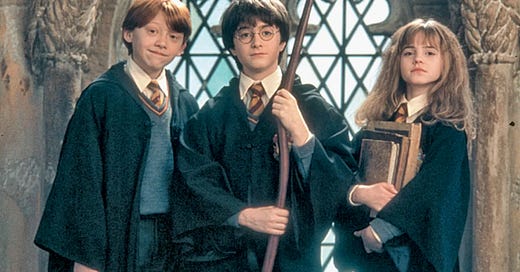Having discussed:
Luke Skywalker, who starts his tale with a Want (the Academy) and then embraces his Destiny-Legacy
-- and Bilbo Baggins, who starts his tale without a Want and then embraces his Destiny-Legacy
-- let us turn to one of the most famous protagonists in popular literature, and an interesting case when it comes to Wants. I’m speaking, of course, of Harry Potter.
Throughout my years teaching worldbuilding, many of my students point to Harry Potter (from the books) as the most successful example of a protagonist-character who starts their story without any real Wants.
And I cannot argue with my students that Harry, at the beginning of the series, isn’t defined by any obvious Wants.
Which is strange considering that Harry is your classic mistreated orphan type, and mistreated orphan types are natural malcontents, railing against their unjust lot in life, or at least longing for better within their hearts — Anne Shirley (of Green Gables), Taran of Caer Dallben, Jon Snow, etc. Not Harry, though. Potter just keeps his head down, wants to avoid trouble. Could you imagine him delivering these lines to the Dursleys?
I am glad you are no relation of mine. I will never call you aunt again as long as I live. I will never come to visit you when I am grown up; and if any one asks me how I liked you, and how you treated me, I will say the very thought of you makes me sick, and that you treated me with miserable cruelty.
The Boy Who Lived is no Jane Eyre.
Even Luke Skywalker, who is a well-treated orphan type, chafes at his constraints more than Harry ever does.
Harry starts out as the one of the great non-boat-rockers in fantasy literature (perfect considering how much rocking he’ll need to do by series end). Even when Harry is introduced to his wizard Destiny-Legacy he’s curiously phlegmatic about the whole thing. The Destiny-bombing he endures as he follows Hagrid around Diagon Alley, and the ominous revelation that his wand has the same core as the one that Voldemort used to killed his folks (hint hint) elicits nada. Compare Harry to Luke Skywalker, who nearly spits out his drink when his Uncle Owen mentions that Ben Kenobi might have died at the same time as Luke’s father. Compare Harry to Bruce Wayne, the other Boy Who Lived whose parents were also murdered in front of his eyes but whose every Want is shaped by that murder.
That said, just because Harry starts the series more Neville Chamberlain than Shaka Zulu doesn’t mean Potter lacks character. Far from it. Potter has many admirable traits; he doesn’t pity himself during his under-the-stairs-days or curse the universe for his lot or demonize the Dursleys despite their awfulness, and when Draco Malfoy sneeringly describes the gamekeeper as a savage, Harry defends Hagrid.
Harry’s a deeply decent and refreshingly non-judgmental young person. His starting neither-here-nor-there-ness might not be typical in the YA lit crowd but it clearly resonates with a lot of young readers who might not know to which House they belong, but nevertheless possess (or aspire to) a quiet invincible decency.
(One suspects that Potter’s low-key design was a subtle jab at the torrent of YA protagonists who all seem to have been started from the same REBEL yeast. One can also see why so many publishers, weaned on firebrand-from-jump YA protagonists, might have rejected Harry Potter and the Sorcerer’s Stone’s slow-roll).
2
So, Harry kicks off his adventure with no real Wants and unlike so many of his YA peers, our protagonist ain’t for or against his Destiny-Legacy in any meaningful way. (In narratives of power, rejecting one’s Destiny-Legacy virulently is a preamble to embracing one’s Destiny-Legacy -- and its power -- virulently).
So what does Harry Potter have, structurally, to help propel the character and novel?




